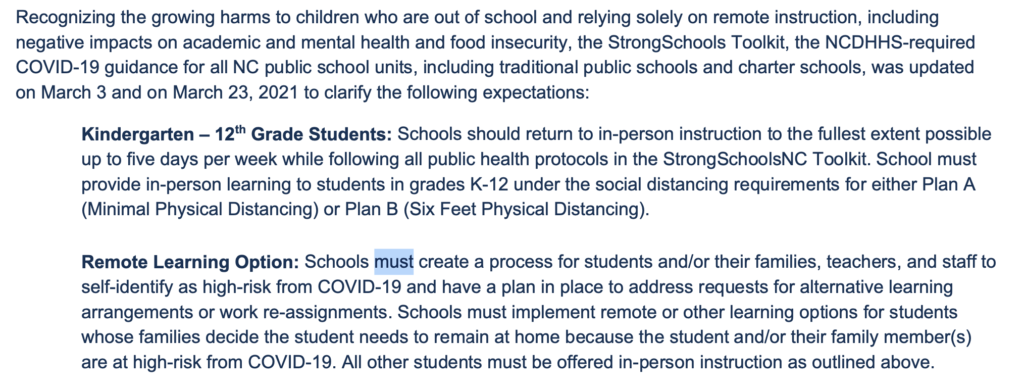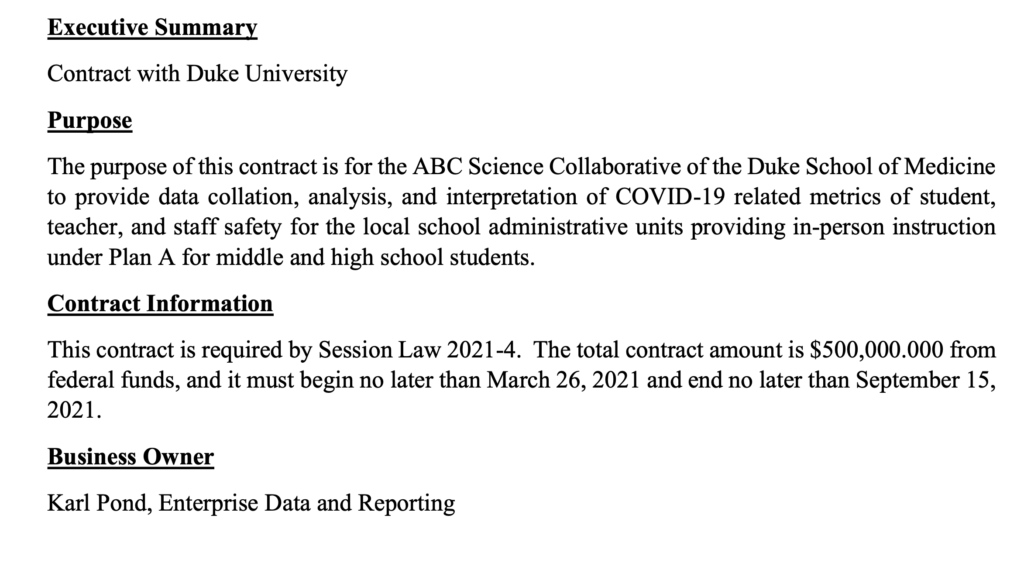

The biggest news this week doesn’t come from the General Assembly — but it’s heading there. Gov. Roy Cooper unveiled his budget proposal for the next two years, which includes an average 10% increase in salary for teachers over the biennium, as well as $2,000 bonuses. He mentioned that all of this money is partly in recognition of the fact that teachers haven’t gotten any salary bumps for a while due to the fact that the governor and legislative Republicans did not reach a deal on a biennium budget back in 2019.
The two chambers of the General Assembly are next up in the budget process. The Senate will develop and present its budget plan for the next two years, and then the House will do so. After that, everybody gets to hash out their differences.
Read more about the governor’s budget plan here.
Even fewer COVID-19 restrictions in schools
The Centers for Disease Control and Prevention recently announced that students in schools could now socially distance 3 feet apart, rather than 6 feet apart, and likely be OK when it comes to COVID-19. Meanwhile, the North Carolina Department of Health and Human Services (DHHS) modified its guidance around schools this week to allow all grades to go back to school under either plan A or plan B. Plan A does not have any social distancing requirements while plan B requires everyone to maintain six feet of social distance. The new guidance also eliminates daily symptom screenings for students.


The new guidance also means that charter schools can now return their grade 6-12 students back to classrooms under plan A. Earlier this month, a deal struck between lawmakers and the governor made it possible for all traditional public school students to return under plan A, but charter schools were left out of that deal. Legislation that was moving through the General Assembly earlier this week would have rectified the situation, but now that the DHHS guidelines have been changed, the bill is no longer necessary.
The State Board of Education met virtually this week and voted to adopt the new guidance set forth by DHHS. They also approved a contract with the ABC Science Collaborative at Duke University. The Collaborative is going to be tracking and analyzing COVID-19 data in the state’s public middle and high schools.


Odds and ends
A bill that would make learning about the Holocaust and genocide part of the standard course of study in North Carolina schools passed a House education committee this week and goes now to a House appropriations committee.
A bill that would ensure public schools have resources available for students on child abuse and neglect passed the House and goes now to the Senate.
A bill that would make some changes to the standards governing student conduct in state public schools passed a House education committee and goes now to the House rules committee.
A bill passed a House education committee that would have the state Department of Public Instruction study changing the funding formula for children with disabilities so that those students with more severe disabilities would receive more money. The bill also increases the cap on the current funding formula from 12.75% to 13%. It goes now to the House appropriations committee.
A bill that would expand the state’s opportunity scholarship program also passed a House education committee this week. Rather than offering a fixed amount in the form of the scholarship, the change would fund students “up to seventy percent (70%) of the average State per pupil allocation in the prior fiscal year,” instead. That goes up to 80% in the 2023-24 school year. The bill also merges the Special Education Scholarship for Children with Disabilities and the Personal Education Savings Account and makes funding for the program mainly a percentage of average state per-pupil allocation. The bill goes now to the House educations appropriations committee.
A bill that incentivizes renovation of historic education buildings so those buildings can keep being used for “educational purposes” passed the House and is now in the Senate.
A bill that promotes “muscadine grape juice usage,” in schools passed the full House and is now in the Senate.
A bill related to the ability of military children to attend local school districts passed two Senate committees this week. It has already passed the House.


